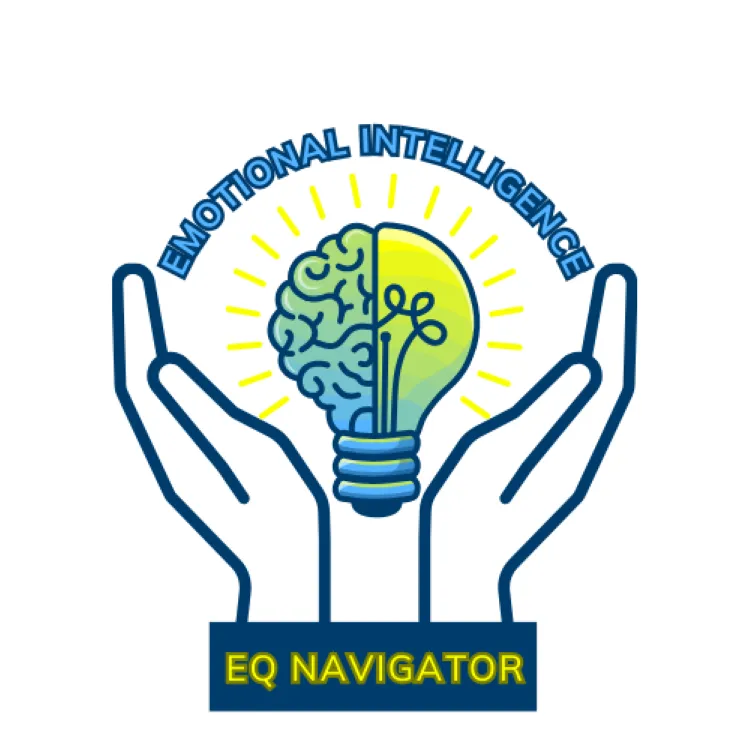
EMOTIONAL INTELLIGENCE: YOUR UNTAPPED POWERSOURCE
What is emotional intelligence, really?
Forget the old myth that emotions and intelligence live in separate worlds. That thinking? Outdated. Emotional Intelligence isn't soft- it's a strategic edge. It's what happens when you stop ignoring your inner world and start using it as fuel.
Emotional Intelligence is the ability to recognize, understand and harness emotions-yours and everyone else's. It's not about control. It's about creation. It's the power to shape conversations, lead with purpose, and make decisions that actually resonate.

PERCEIVING EMOTIONS

USING EMOTIONS TO REASON

UNDERSTANDING EMOTIONS

MANAGING EMOTIONS
People used to consider intelligence and emotions as opposites. However, the intersection of the two has been a major area of interest. The way that thinking and emotions interact influences how people behave and make decisions. When professionals are unable to understand and handle emotions, it creates problems for businesses. You might be familiar with the longstanding advice that urges professionals to leave emotions at the door when they arrive at work, but that can dismiss the inevitability and importance of human emotions.
What is emotional intelligence in the workplace?
Several components of emotional intelligence are key for your team to help improve workplace performance:
Social skills
Social skills refer to the ability to work with others and overlap with communication and interpersonal skills. By understanding and considering the emotions of others through active listening and both verbal and nonverbal communication, employees are better prepared to respond appropriately. Social skills are necessary to guide people effectively in a specific direction and influence them in any particular way. They also help build a sense of rapport and trust among employees and managers, as well as an overall healthier workplace culture.
Self-awareness
As one of the primary components of emotional intelligence, self-awareness refers to the ability to identify aspects of yourself, such as emotions, strengths, weaknesses and values. It also allows you to perceive the impressions or effects that you have on others in the workplace. For instance, you may notice that you’re prone to frustration or irritation when working with specific tasks. Being aware of these feelings is the first step to understanding and addressing them, allowing you to improve work performance and be more receptive to constructive criticism/.
Empathy
Being empathetic is not only seeing how others feel, but understanding their emotions and perspective. Empathy is a type of interpersonal skill that implies insight into the emotional state of others and the ability to respond appropriately. With empathy, you can better perceive the emotional dynamics between employees and across the workplace, allowing you to understand and navigate the resulting interactions and behaviors.
This is especially important when resolving conflicts or disagreements, preventing major workplace issues and improving overall workplace culture. Empathy has specific applications in business, such as sensitivity to cross-cultural differences, retaining top talent, hiring outstanding employees and helping people develop professionally.
Self-management
Individuals who practice self-management are able to cope with negative moods and ward off impulsive reactions. This means first recognizing and processing your emotions, and then responding to those who surround you. If you have a strong EQ, you can successfully manage feelings and match them with your passions. For example, in business, when things don’t turn out as you would like or your team makes a mistake, the urge might be to scold the team because of the failure. However, with emotional intelligence, you can see the error from an objective stance and look at all the causes. You can then provide feedback to your team and work toward alternative solutions with them.
Motivation
Motivated individuals tend to pursue their goals and perform their tasks for intrinsic rather than external rewards. That is, a motivated person finds a rewarding degree of purpose and meaning in their work, is passionate about what they do and enjoys the process of ongoing personal development. These individuals are often eager to take on new challenges and goals. A motivated, emotionally intelligent individual works with passion and portrays an optimistic perspective to management, creating a motivating workplace environment.
Why is emotional intelligence important?
Each day, you must make decisions, and most of them are influenced in some way by your emotions. If you have a high EQ, you can understand the emotions of others, manage and convey your own, form healthy relationships and solve problems efficiently — even with the weight of deadlines and other pressures. Employers with high EQ tend to solve problems and make decisions more effectively.
Consequences of a low EQ.

Less emotional accountability.

Ineffective communication between employees and management.

Reduced productivity.

Struggles with constructive feedback and employee development.

Poor team dynamics.

Inefficient decision-making.

Poor problem-solving.

Increased employee turnover and hiring costs.
A workplace without emotional intelligence struggles to function as a team. Mistakes go unowned, communication becomes passive or aggressive, and performance suffers.
Bottom Line:
Emotional Intelligence isn't a soft skill-- it's a leadership essential.
When you build EQ into your culture, your people- and your business - thrive.
Benefits of emotional intelligence at work
Emotional intelligence starts with the individual. The first step? Self-awareness.
When you recognize your emotions in real time, you gain the power to respond--rather than react.
From there, self-management comes into play. That means regulating your emotions, adapting to change, and avoiding impulsive decisions without bottling things up. It's not about suppressing emotion- it's about using it wisely.
With a High EQ, you're better equipped to communicate clearly and constructively-even in stressful or high-stakes moments. You're more in tune with others, and you lead with intention instead of reaction.
Social skills, a core pillar of emotional intelligence, help teams build trust, deepen collaboration, and resolve misunderstandings before they escalate. The result? A more unified, high-functioning workplace culture.
Empathy, is another cornerstone. It's not just about understanding how someone else feels--it's about recognizing how your reactions affect them. This emotional insight strengthens relationships across teams and hierarchy, especially in situations involving feedback, performance, or conflict.
When tension or disagreement arises, EQ helps you find common ground. It empowers you to make others feel seen and heard, which leads to better collaboration, faster resolution, and stronger outcomes.
The bottom line:
Emotional Intelligence transforms how people show up at work.
It reduces friction, strengthens communication, and builds a culture where people feel safe, supported, and empowered to do their best work.
FAQs:Emotional Intelligence at work
What are the signs of an emotionally intelligent person?
People with a high EQ possess many positive qualities. Common characteristics include:
• Adaptability
• Positive Outlook
• Goal-Oriented
• Teamwork Skills
• Mentorship Abilities
• Work-life Balance
• Communication Skills
Why is emotional intelligence matter in leadership?
Because leadership isn't just strategy--It's people
Emotional Intelligent leaders know how to manage themselves and motivate others. They listen deeply, navigate tough conversations with empathy, and bring out the best in their teams--especially in moments of stress, change, or challenge.

